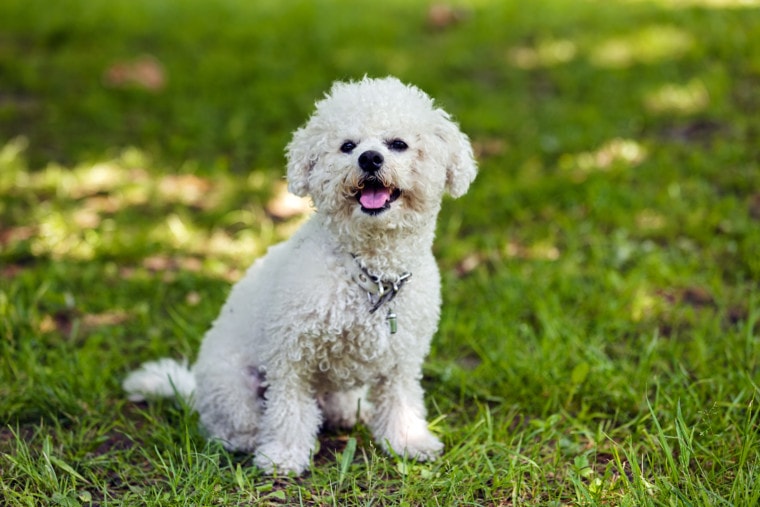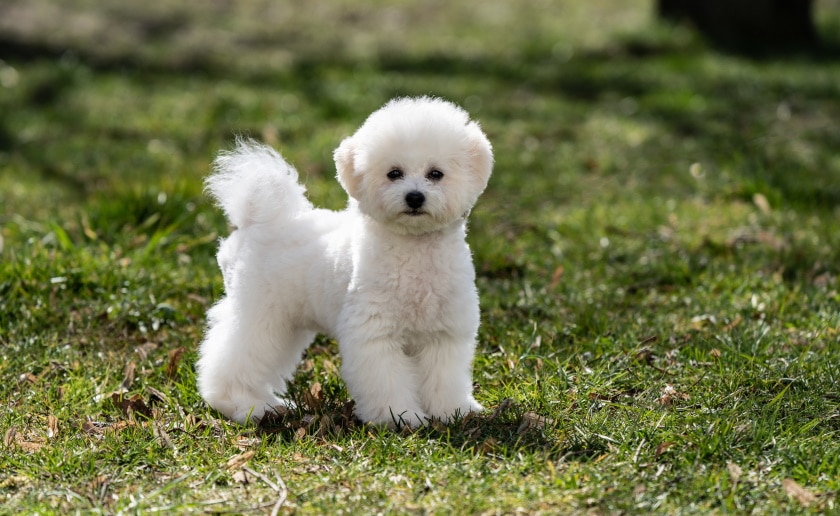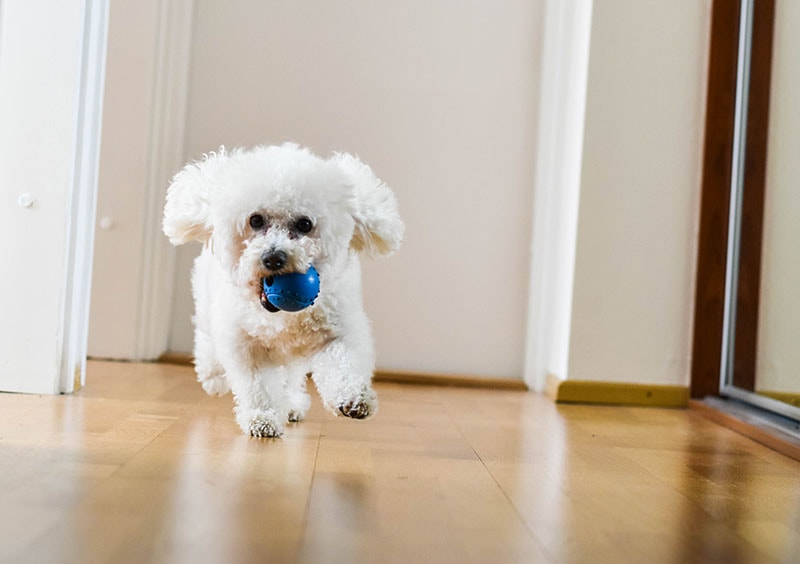
Click Below to Skip Ahead
Recognizable for their fluffy white coats and happy expressions, the Bichon Frise is a popular little dog who wants to be friends with everyone they meet! Bichons are known for their winning personalities and use their charm to great effect. Because of their size and activity level, Bichons are a great fit for a variety of families and living situations. They are happy to run and play in a yard or to cuddle in your lap. So long as they get to spend plenty of time with you, a Bichon will be content. The best part might even be that Bichons Frises are considered a hypoallergenic breed because they don’t shed much. Even allergy sufferers may be able to share their home with these dogs!
Breed Overview
Height
9.5 – 11.5 inches
Weight
12 – 18 pounds
Lifespan
14 – 15 years
Colors
White, white and buff, white and apricot, white and cream
Suitable for
Anyone looking for a smart, low-shedding, allergy-friendly breed with personality
Temperament
Playful, curious, peppy, charming, gets along well with everyone, human or animal
Think you might want to welcome a Bichon Frise into your family? Read on to learn more about the Bichon and see if this breed might be a good match for you!
Bichon Frise Dogs Characteristics
Bichon Frise Puppies
The Bichon Frise is a popular breed and puppies from reputable breeders may be expensive. Especially because they are a smaller breed, it is extremely important to be sure you are purchasing a Bichon puppy from a responsible breeder and not a puppy mill. You should also not buy a Bichon from a pet store, as they usually get their dogs from puppy mills.
If you like the idea of rescuing rather than buying a Bichon Frise, you are in luck! There are quite a few Bichon Frise rescue groups across the country, and you may even find a Bichon at your local animal shelter. The cost to adopt a Bichon Frise will vary by a rescue group or animal shelter but will usually include the cost of spaying or neutering your new pet and basic vaccinations.
Temperament & Intelligence of the Bichon Frise
Bichons Frises are famous for their fantastic temperaments and endearing personalities. They are social, friendly, and draw smiles nearly everywhere they go. Bichons are also smart and curious dogs who enjoy learning tricks and being the center of attention.
Are These Dogs Good for Families? 👪
Bichons are wonderful dogs for families, especially families with allergy sufferers. They do very well with children and are sturdier than some small breeds. Of course, children should be taught how to properly play with and handle the dogs, as they are still much larger than a Bichon and could hurt them with rough play. Small children and dogs, no matter how docile, should always be supervised as a general rule.
Because they are a low shedding breed, Bichons thrive in a variety of living situations including apartments and city life. However, they definitely expect to be treated as part of the family and will not do well if left alone frequently. They are not a good choice for families that prefer their dogs to be seen and not heard, so to speak.
Does This Breed Get Along with Other Pets?
The Bichon Frise’s affable personality extends to other household pets as well. Bichons generally get along with other pets, although early socialization is ideal. If you are rescuing an adult Bichon with an unknown socialization history, it’s never a bad idea to introduce them slowly and with supervision to any other pets in your family. Chances are they will all take to each other well and become one big happy family.
Things to Know When Owning a Bichon Frise:
Is just reading about the winning personality of the Bichon Frise enough to make you want to add one to your family? While your heart may be won over, it’s important to use your head as well and find out as much as you can about the proper care of Bichons before you make your final decision. Here is some more detailed information about what is required to keep a Bichon happy and healthy in your home.
Food & Diet Requirements 🦴

Healthy Bichons Frises will do well on any high-quality, nutritionally balanced diet. You may choose to feed commercial dog food or to prepare a homemade diet for your Bichon. To be certain that homemade diets are properly balanced, you should consult with your veterinarian.
As a breed, Bichons can be prone to allergies, including food allergies. Food allergies can make your Bichonʻs skin irritated and itchy. If you suspect that your Bichon may be developing a food allergy, talk to your veterinarian about whether a special diet may help.
Exercise 🐕
The Bichon Frise is an active breed, even though they are smaller dogs. They require daily exercise, whether in the form of walks or active play with their humans. Because they are smaller, their activity needs can be met in a variety of living situations including apartments. That being said, Bichons are very fast for their size and should not be allowed off-leash in an unsecured area.
Training 🎾

Overall, Bichons Frises are clever dogs who are usually easy to train and especially enjoy learning tricks. However, Bichons can reportedly be difficult to housetrain, which is something to keep in mind when considering getting a Bichon Frise. In house training and all other types of training, Bichons will respond best to positive, reward-based methods. As already discussed, the Bichon Frise is a very social breed and your dog may develop negative, destructive behaviors if left alone too often.
Grooming ✂️
The Bichon’s trademark white, fluffy coat does require some regular maintenance to keep them looking their best. Ideally, Bichons Frises should be bathed and clipped about once a month. You will need to factor the cost of regular visits to the groomer into your pet budget if you own a Bichon. Some Bichon owners choose to learn how to properly groom them at home, which can save money long term.
In between visits to the groomer, keep your Bichon’s coat healthy with regular brushing sessions. Daily brushing is best, but they should be brushed two or three times a week at a minimum. Bichons Frises do not shed much but they can become matted easily.
While all dogs should have their teeth brushed regularly, Bichons Frises are especially prone to suffer dental disease. Extra attention should be given to keeping their teeth healthy with brushing, dental treats, and whatever other methods your veterinarian recommends. Bichons Frises may even require routine dental cleanings by your veterinarian.
Health and Conditions 🏥
While overall considered a relatively healthy breed, Bichons Frises are prone to several health conditions, some more serious than others. A few of these conditions are described below. Responsible breeders will screen for genetic health conditions before breeding their dogs. Don’t be afraid to ask for a complete health history of a puppy’s parents before you purchase them. A reputable breeder will want to make sure you are getting a healthy dog.
As previously mentioned, Bichons Frises are prone to allergies, whether from food or other sources in their environment. While not necessarily life-threatening, severe allergies can make your Bichon itchy and uncomfortable and can be difficult and expensive to manage.
Bichons can also suffer a joint condition called luxating patellas, where their kneecap doesn’t fit properly into the joint and can pop out of place. This condition can be painful over time and often requires surgery to correct.
Another condition Bichons Frises may develop is Cushing’s syndrome, a hormonal imbalance. This is a treatable condition but does require medication.
Some Bichons Frises are born with a type of liver condition known as a shunt, where blood doesnʻt flow into the liver properly. If severe, this condition may require surgery.
Like a lot of other, usually large breed dogs, Bichons can suffer from hip dysplasia, a bone condition where the hip joint doesn’t fit correctly into the socket. This can be painful and sometimes requires surgery to fix.
Male vs Female
Choosing whether to get a male or female Bichons Frises is often a matter of personal preference. But are there any differences between the two that could help make up your mind?
Male Bichons tend to be a bit larger than females and are reported to sometimes be more playful. Some owners and breeders find female Bichons to be a bit more independent and stubborn than males.
Another factor to consider is the sex of any dogs already in your family. As a general rule, dogs of the opposite sex get along better. Of course, you will need to consider how to prevent unwanted pregnancy and keep male and female dogs separate while the female is in heat. Neutering and spaying your dogs is the easiest way to keep this from being a problem.
3 Little-Known Facts About the Bichon Frise Dogs
1. They Were Often Drawn Like One Of The French (Dogs)
Bichons Frises were popular lap dogs among French and other European royals in the 16th century. These royals were frequent subjects of famous painters and their Bichons were often featured as well. Bichons can be found in works of art by such artists as Titian and Goya.
2. They Survived The French Revolution By Joining The Circus
During the French Revolution, French nobles found themselves in danger of arrest and execution. With their royal owners in prison or worse, Bichons often ended up abandoned to the streets of France. Fortunately, the charming and intelligent Bichons turned out to be the perfect circus dog. Street entertainers rescued many of them and trained them to perform. Adapting to show business turned out to be a breed-saving proposition for the Bichon Frise.
3. Their Personalities Are as Good as Gold (At Least in The 13th Century)
In the 13th century, Bichon Frise and their sunny personalities were popular passengers on Italian sailing ships. The sailors actually used the little dogs as barter for supplies as they traveled the known world. This is one reason the popularity of the Bichon was so widespread in Renaissance-era Europe.
Final Thoughts
Bichon Frises are a breed that fits in well with a lot of different families and lifestyles, which is one reason they are so popular. Now that you know more about them, it’s easy to see their appeal. If you are ready to welcome a Bichon into your family, please be thoughtful about where you chose to acquire your new dog. If you are able, rescuing a Bichon Frise is a great way to help contribute to ending the problem of pet overpopulation. If you do choose to buy, make sure you select a responsible breeder who will help make sure you get a happy, healthy puppy that you can enjoy for many years to come!
You may also find these interesting:
- Yo-Chon (Bichon Frise, Yorkshire Terrier Mix)
- Male vs Female Bichon Frises: What are the Differences?
Featured Image Credit: Vladimir Nenezic, Shutterstock









